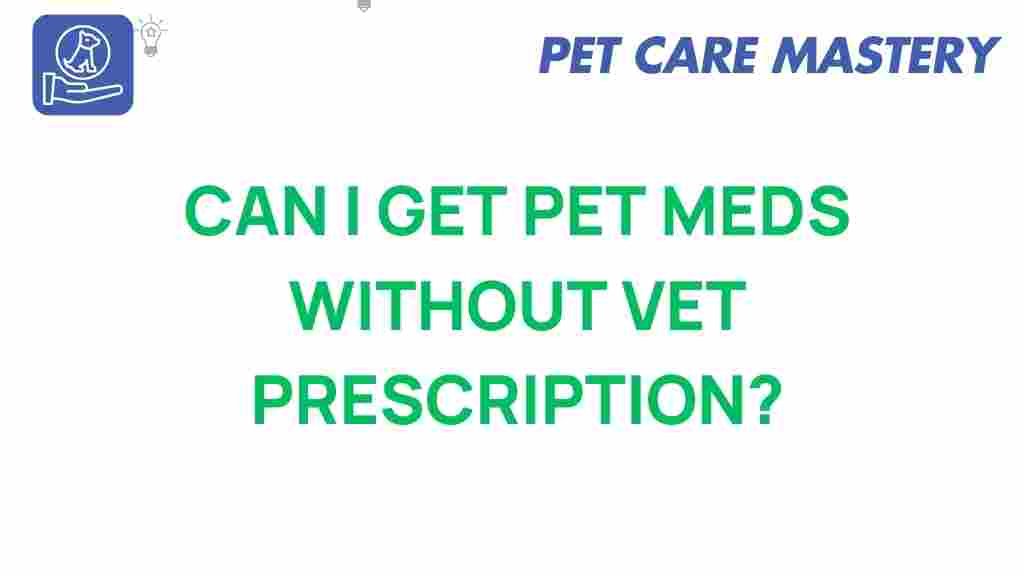When it comes to our furry friends, the need for pet medications can arise unexpectedly. Whether it’s for a chronic condition, a sudden illness, or preventive care, many pet owners find themselves asking, “Can I get pet medications without a vet prescription?” This question is crucial, especially for those looking to save money or explore alternative treatment options. In this article, we’ll delve into the regulations surrounding pet medications, discuss the importance of prescriptions, and offer guidance on how to navigate this complex maze.
Understanding Pet Medications
Before we dive into the intricacies of prescriptions, it’s essential to understand what pet medications entail. Just like humans, pets require various medications for health issues, including:
- Antibiotics
- Anti-inflammatory drugs
- Pain relief medications
- Flea and tick preventatives
- Heartworm medications
- Chronic condition treatments (e.g., diabetes, arthritis)
Each of these medications plays a vital role in maintaining your pet’s health, and many of them are regulated by law to ensure safety and efficacy.
Why Are Vet Prescriptions Necessary?
One of the primary reasons vet prescriptions are required for many pet medications is to ensure the safety and well-being of your pet. Here are a few critical reasons why:
- Correct Diagnosis: Vets are trained to diagnose health issues accurately. A prescription ensures that the medication is appropriate for your pet’s specific condition.
- Proper Dosage: Incorrect dosages can lead to severe health complications. Vets can provide the right dosage based on your pet’s weight, age, and health status.
- Monitoring Side Effects: Some medications can have side effects. A vet can monitor your pet’s reaction and make necessary adjustments.
- Preventing Drug Interactions: Pets may be on multiple medications, and a vet can ensure that there are no adverse interactions.
Can You Obtain Pet Medications Without a Vet Prescription?
The short answer is: it depends. Here’s a closer look at the scenarios where you might be able to obtain pet medications without a vet prescription.
1. Over-the-Counter (OTC) Medications
Some pet medications are available over-the-counter and do not require a vet prescription. These typically include:
- Flea and tick treatments
- Wormers
- Basic supplements and vitamins
While these may be easier to obtain, it’s still advisable to consult with your veterinarian to ensure they are appropriate for your pet’s health needs.
2. Online Pharmacies
Many online pharmacies offer pet medications, and some may not require a prescription for certain products. However, it’s crucial to ensure that the online pharmacy is legitimate and follows regulatory guidelines. Here’s how to find a reputable online pharmacy:
- Look for pharmacies accredited by the National Association of Boards of Pharmacy (NABP).
- Check for customer reviews and ratings.
- Confirm that they require a valid prescription for prescription medications.
3. Compounding Pharmacies
Compounding pharmacies can sometimes provide pet medications without a vet prescription, especially if they create customized versions of medications. However, it’s essential to have a vet involved in the process to ensure safety and efficacy.
4. Telemedicine Options
With the rise of telemedicine, some veterinarians now offer online consultations. You can discuss your pet’s health issues and, if appropriate, receive a prescription without an in-person visit. This can be a convenient option for non-emergency situations.
Step-by-Step Process to Obtain Pet Medications
If you’ve determined that your pet needs medication, follow these steps to navigate the process:
Step 1: Consult Your Veterinarian
Schedule an appointment with your vet to discuss your pet’s condition. Provide them with as much information as possible, including:
- Your pet’s medical history
- Current medications
- Any observed symptoms
Step 2: Get a Prescription
If your vet determines that your pet requires medication, they will write a prescription. Make sure to ask questions about:
- How to administer the medication
- Possible side effects
- Follow-up care
Step 3: Choose Where to Buy
Once you have a prescription, you can purchase the medication from:
- Your vet’s office
- A local pharmacy
- Online pet pharmacies
Compare prices and availability to ensure you’re getting the best deal.
Step 4: Follow Up
After administering the medication, monitor your pet for any side effects or changes in behavior. Schedule a follow-up appointment if necessary.
Troubleshooting Tips
Sometimes, obtaining pet medications can be challenging. Here are some troubleshooting tips:
1. If You Can’t Afford the Medication
If the cost of prescribed medications is too high, consider:
- Asking your vet for a generic alternative.
- Exploring discount programs or assistance from pet charities.
- Checking for manufacturer coupons online.
2. If Your Pet Refuses Medication
Some pets can be picky about taking medication. Here are a few strategies:
- Mix the medication with their favorite food.
- Use a pill pocket or treat designed for administering medication.
- Consult your vet for alternative forms of the medication (liquid vs. pill).
3. If You Suspect a Reaction
If your pet shows signs of an allergic reaction or adverse effects, such as:
- Vomiting
- Diarrhea
- Swelling
- Excessive scratching
Contact your veterinarian immediately for guidance.
Conclusion
Navigating the world of pet medications can be daunting, especially when it comes to understanding prescription requirements. While it is possible to obtain some medications without a vet prescription, it is always best to consult with a veterinarian to ensure your pet receives the correct treatment. By following the steps outlined in this article, you can ensure your furry friend gets the medications they need safely and effectively. Remember, your vet is your best resource for your pet’s health and well-being.
For more information on pet health and medications, visit this resource.
This article is in the category Health and created by PetCareMastery Team
